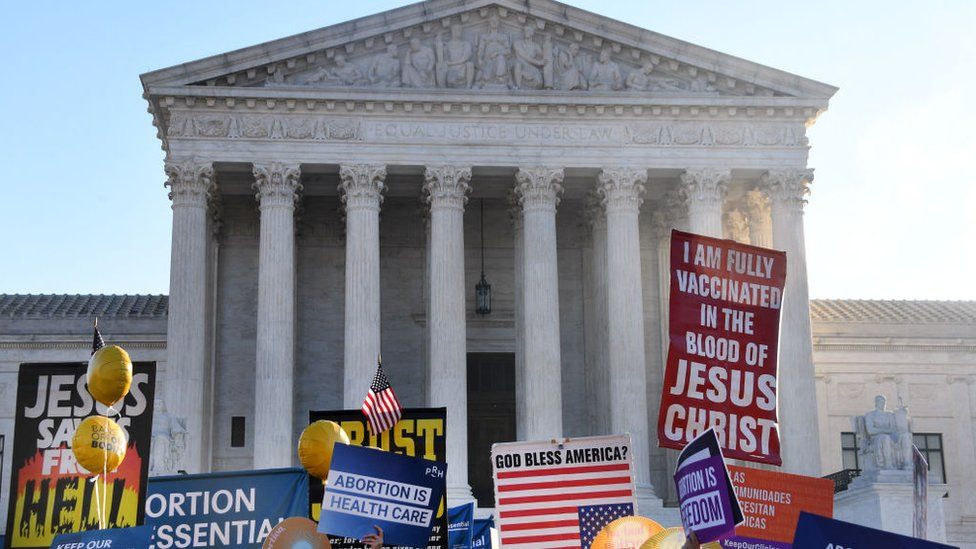US Supreme Court hears landmark abortion case

The US Supreme Court has heard arguments in the country’s most important abortion case in decades.
The case, Dobbs v Jackson Women’s Health Organization, concerns a Mississippi law that bans abortions after 15 weeks of pregnancy.
The court has never before allowed bans before a foetus can survive outside the womb, around 24 weeks, but appeared open to such restrictions on Wednesday.
The ruling, expected in June, may see millions of women lose abortion access.
Both sides of the debate regard this case as an all-or-nothing fight over abortion rights, with nationwide consequences.
Lawyers defending the Mississippi law have explicitly asked the court to overturn two landmark decisions regarding abortion.
The first, 1973’s Roe v Wade, gave women in the US an absolute right to an abortion in the first three months of pregnancy, and limited rights in the second trimester.
Nearly two decades later, in Planned Parenthood v Casey, the court ruled that states could not place an “undue burden” on women seeking abortions before foetal viability, about 24 weeks.
In the years since, foetal viability standard has acted as a red line in abortion law, preventing any bans an abortion before this time.
But addressing the court today – with its 6-to-3 conservative majority – Mississippi Solicitor General Scott Stewart told justices that the two rulings “haunt our country” and “poison the law”.
Mr Stewart took direct aim at the existing foetal viability standard, arguing that it is not “tethered” to the Constitution or any other historical precedent.
Justice Sonya Sotomayor, a liberal, took issue with this claim, responding: “there’s so much that’s not in the Constitution”.
Representing Jackson Women’s Health Organization – the only abortion clinic in Mississippi – Julie Rikelman of the Center for Reproductive Rights spoke next, asking the court to strike down the Mississippi law and maintain a woman’s right to abortion.
“Mississippi’s ban on abortion, two months before viability, is flatly unconstitutional under decades of precedent,” Ms Rickelman said. Mississippi’s law would “force women to remain pregnant and give birth against their will”.
Ms Rickleman underlined her argument that foetal viability is the “central holding” of both Roe and Casey, and urged the court to uphold its own precedent. But she faced pointed questioning from several of the justices, including Chief Justice John Roberts, on why the viability standard is appropriate.
In his questions on Wednesday, the chief justice appeared open to abortion bans after 15 weeks, a troubling sign for abortion advocates because Mr Roberts is seen widely as the ideological centrist of the court.
The US Solicitor General Elizabeth Prelogar also spoke before the court today, arguing against the Mississippi abortion ban on behalf of the Biden administration.
“The real world effects of overruling Roe and Casey would be severe and swift,” she said, adding that women have come to rely on this “fundamental right”.
If the court strikes down Roe v Wade, or rules that the Mississippi law does not place an undue burden on women seeking abortions before foetal viability, at least 21 states are expected to introduce abortion restrictions, including outright bans after 15 weeks.
In these states, nearly half of US women of reproductive age (18-49) – some 36 million people – could lose abortion access, according to research from Planned Parenthood, a healthcare organisation that provides abortions.
Carol Tobias, president of anti-abortion group National Right to Life, told the BBC she was optimistic that the court would step in “to protect unborn children”.
“We certainly hope that they will let the Mississippi law stand,” she said. “We’d love to see them go even further and say that unborn human beings deserve the same protection as born human beings.”
Some experts have predicted dangerous ripple effects if abortion is restricted.
“We will see significant increases in maternal mortality, which are already disproportionately experienced by women of colour. We will see families descend into greater levels of poverty because the inability to take care of kids, rises in domestic violence,” said Katherine Franke, director of the center for gender and sexuality law at Columbia University.
Contact Us
The US Armenians promotes businesses, advertising, collaborates, lists jobs, buys and sells products, and many more ideas. We would like to hear your thoughts and feedback, so please feel free to contact us through direct message, or via email at theusarmenians@gmail.com
If you have any questions/concerns about our website/social media platforms, feel free to contact us via email and we will get back to you as soon as possible.
For business/collaboration inquires, feel free to email us, and please in the Subject enter “BUSINESS”.
Thank you!
-
Email:theusarmenians@gmail.com
-
City:Los Angeles

